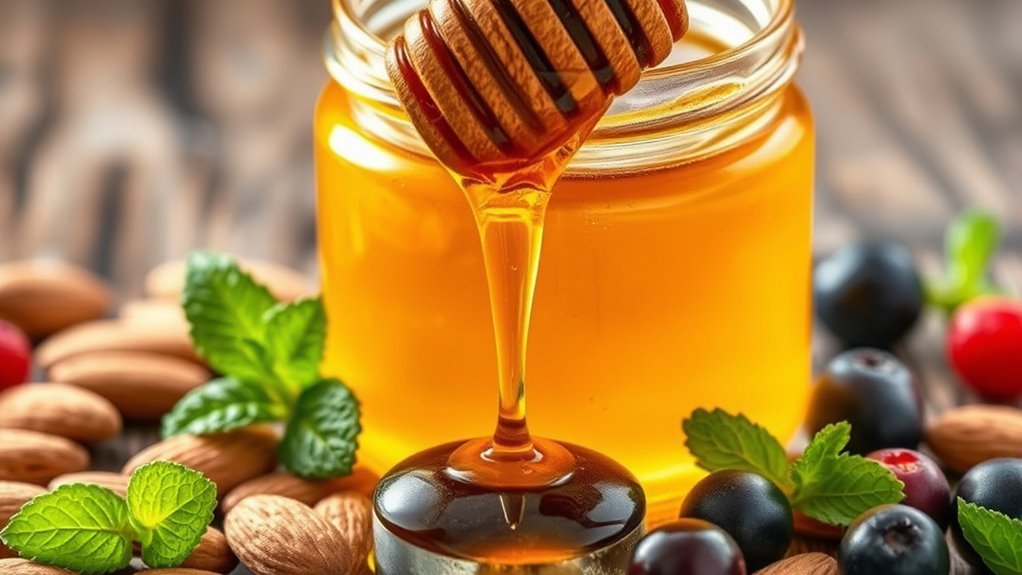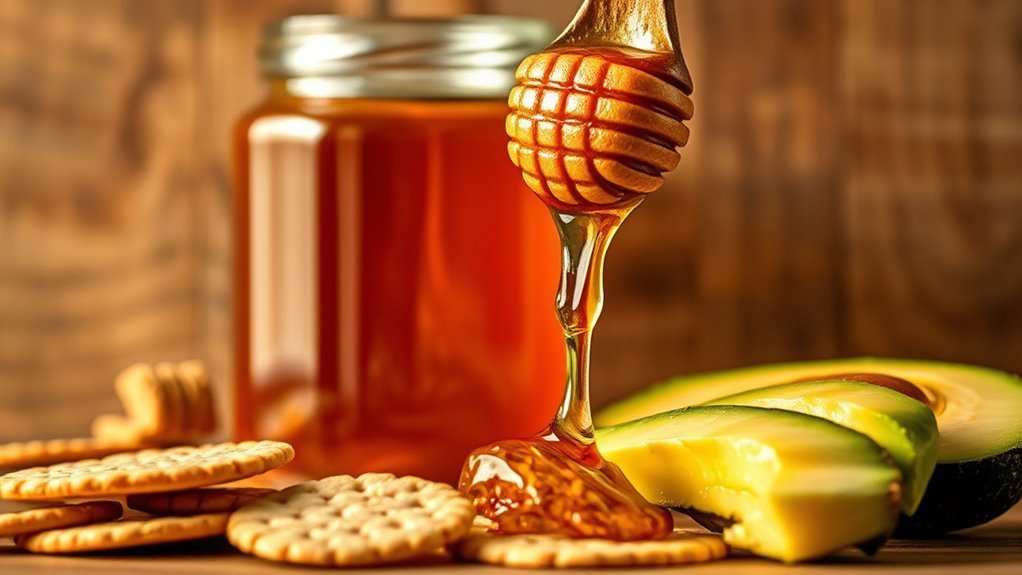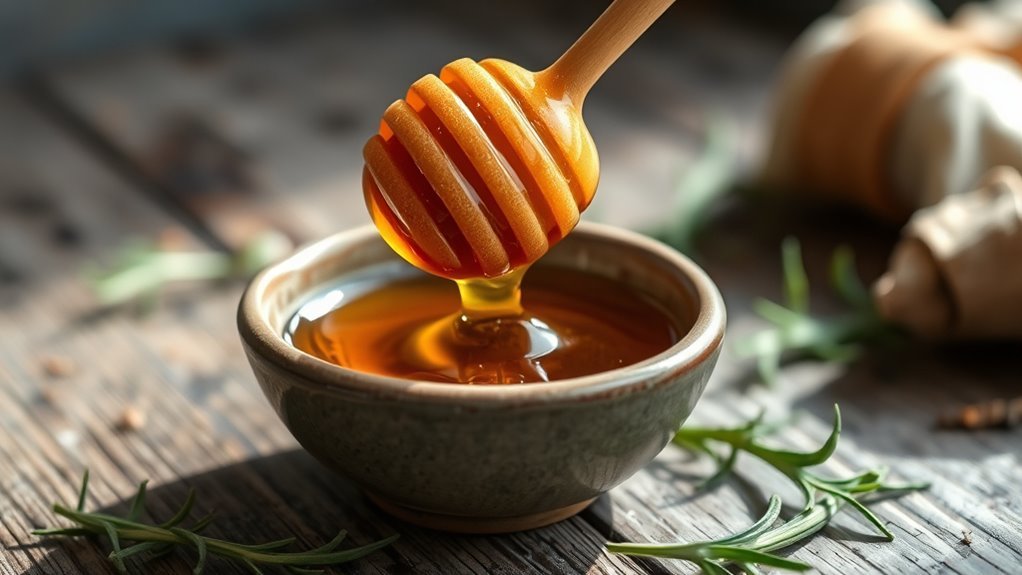Honey isn’t the best option for a keto diet. It’s packed with carbs, containing about 17 grams per tablespoon, which can spike your blood sugar and disrupt ketosis. While it has some health benefits and antioxidants, those advantages don’t outweigh its impact on maintaining a low-carb lifestyle. There are better alternatives like stevia or erythritol that can satisfy your sweet tooth without derailing your keto goals. Discover more options to keep your diet on track.
Nutritional Profile of Honey

When it comes to understanding the nutritional profile of honey, it is essential to recognize that this natural sweetener is more than just sugar. Its honey composition includes various sugars, primarily fructose and glucose, which contribute to its unique flavor and health benefits. One key aspect you should consider is the glycemic index (GI) of honey, which typically ranges from 45 to 64, depending on the specific type. This means honey can raise blood sugar levels more gradually than refined sugar, making it a potentially better alternative for some. Additionally, honey contains trace vitamins, minerals, and antioxidants. While it’s still a source of carbohydrates, its nutritional profile offers more than just sweetness, providing a more complex option in your dietary choices.
The Impact of Honey on Ketosis

Although honey offers some health benefits, its impact on ketosis can complicate your low-carb diet. When you consume honey, its natural sugars influence your honey metabolism, which can have several ketosis effects:
- Blood Sugar Spike: Honey can rapidly increase your blood sugar levels, potentially disrupting ketosis.
- Insulin Response: The sugars in honey may trigger an insulin response, making it harder to maintain ketosis.
- Carb Content: With about 17 grams of carbs per tablespoon, honey can quickly use up your daily carb allowance.
- Fat Burning: Excess sugar intake can shift your body away from fat burning, a primary goal of a ketogenic diet.
Health Benefits of Honey

While honey may not be ideal for those strictly adhering to a ketogenic diet, it does offer several notable health benefits that shouldn’t be overlooked. For starters, honey varieties like manuka have antimicrobial properties, which can help support your immune system. Additionally, honey is rich in antioxidants, helping to combat oxidative stress and inflammation in your body. It’s also been shown to soothe sore throats and improve digestive health. However, moderation is key, as excessive consumption can lead to unwanted sugar intake. If you choose to incorporate honey into your diet, selecting high-quality varieties can maximize these health benefits, allowing you to enjoy its sweetness while reaping some rewards for your well-being.
Alternatives to Honey on a Keto Diet
Finding suitable alternatives to honey on a keto diet can enhance your culinary experience without compromising your carbohydrate limits. Here are some great options for sugar substitutes and natural sweeteners:
- Stevia: A plant-derived sweetener with zero calories and carbs, perfect for sweetening beverages or recipes.
- Erythritol: This sugar alcohol has minimal calories and won’t spike your blood sugar, making it a popular choice for baking.
- Monk Fruit Sweetener: A natural sweetener that’s calorie-free and much sweeter than sugar, ideal for desserts.
- Allulose: A rare sugar that mimics honey’s texture and sweetness, it has minimal impact on blood glucose.
These alternatives let you enjoy sweetness while sticking to your keto goals! Additionally, sweeteners like these help reduce cravings for sugary foods, allowing for a more sustainable low-carb lifestyle.
Tips for Incorporating Sweeteners on Keto
When you’re maneuvering a keto diet, incorporating sweeteners can enhance your meals without derailing your carbohydrate goals. Start by exploring various sweetener options like stevia, erythritol, and monk fruit. These keto-friendly substitutes provide sweetness while keeping carbs low. It’s essential to read labels, as some products contain hidden sugars or high-carb fillers. You might also consider experimenting with different combinations to find the flavor profile that suits your palate best. Remember to start with small amounts, as some sweeteners can be considerably sweeter than sugar, and adjust according to your taste. Finally, be mindful of how these sweeteners affect your body—everyone’s different, and finding what works for you is key to maintaining that freedom on your keto journey. Additionally, opting for low-carb alternatives can help you stay within your daily carb allowance and support your goals.
Frequently Asked Questions
Is Raw Honey Different From Processed Honey on Keto?
Imagine standing at a crossroads: one path leads to raw honey, buzzing with nature’s benefits, while the other meanders through processed honey’s sugary maze. Raw honey retains enzymes and antioxidants, offering health perks, but both types are high in carbs. When you compare them, processed honey often loses essential nutrients, making raw honey a better choice for those seeking natural sweetness. Ultimately, moderation is key on your journey, especially within a keto lifestyle.
Can Honey Cause Sugar Cravings on a Keto Diet?
Yes, honey can cause sugar cravings on a keto diet. Its natural sugars can trigger your brain’s reward system, potentially leading to sugar addiction. While you might crave the sweetness, it could derail your keto goals and lead to keto cravings. By consuming honey, you risk reintroducing a dependency on sugar, making it harder to maintain your desired state of ketosis. Staying mindful of your choices is key to achieving freedom in your diet.
How Does Honey Affect Blood Sugar Levels?
Honey has a glycemic index of about 58, which means it can raise your blood sugar levels more than some other sweeteners. When you consume honey, you might notice a quick spike in your blood sugar response, especially if you’re sensitive to carbohydrates. If you’re aiming for stable energy levels on a keto diet, keeping your intake of honey minimal is wise. Balance is key to maintaining your overall health and energy.
What Are the Best Uses for Honey on Keto?
While honey’s sweet allure might tempt you, its best uses on keto are limited. If you’re seeking honey benefits, consider using it sparingly in recipes that allow for a touch of sweetness without derailing your carb count. It can enhance keto recipes like marinades or dressings, adding flavor without overwhelming the dish. Just remember, moderation is key, as a little goes a long way in maintaining your low-carb lifestyle.
Are There Any Keto-Friendly Honey Substitutes?
Yes, there are several keto-friendly honey alternatives you can use! Consider options like erythritol, monk fruit sweetener, or stevia, which are all low in carbs and great for sweetening your dishes. These keto sweeteners mimic the sweetness of honey without the sugar spikes. You can also try allulose, a unique sugar that tastes like honey but has minimal impact on blood sugar. Enjoy experimenting with these alternatives to satisfy your sweet cravings!
Can I have honey while on a keto diet?
While honey is a natural sweetener, it is also high in carbohydrates and sugars, which can disrupt ketosis. A standard keto diet typically limits daily carbohydrate intake to around 20-50 grams. A single tablespoon of honey contains about 17 grams of carbohydrates, making it difficult to fit into a strict keto plan. If you do choose to include honey, it should be in very small amounts and balanced with your overall carb intake for the day.
What sweeteners are more suitable for a keto diet instead of honey?
There are several keto-friendly sweeteners that can be used as alternatives to honey. Popular options include erythritol, stevia, monk fruit, and allulose. These sweeteners are low in carbohydrates and do not significantly impact blood sugar levels, making them suitable for a ketogenic lifestyle. Always check labels for any hidden carbs in processed products and consider individual taste preferences when choosing a sweetener.
What are the health benefits of honey despite being high in carbs?
Honey has various health benefits, including its antibacterial and anti-inflammatory properties. It contains antioxidants and can help soothe sore throats and improve digestive health. However, these benefits must be weighed against its high carbohydrate content, which can hinder ketosis on a keto diet. If you’re not strictly following keto, using honey in moderation can be beneficial, but it should still be consumed mindfully.
Can I use honey in small amounts on a keto diet?
Yes, you can use honey in very small amounts on a keto diet, but it requires careful consideration of your total daily carbohydrate allowance. If you choose to use honey, it’s best to do so sparingly and to account for the carbs it contributes to your daily intake. Some individuals may find a small amount of honey works for them without knocking them out of ketosis, while others may be more sensitive to carbohydrate intake.
Are there any specific keto recipes that use honey?
While traditional keto recipes often avoid honey, there are some creative ways to incorporate it in very small amounts. For example, you can make a keto-friendly salad dressing using a teaspoon of honey mixed with olive oil, vinegar, and spices. Additionally, some low-carb baked goods might use honey for flavor, but it’s important to adjust the other ingredients to keep the overall carb count low. Always be cautious and consider the total carbs in your recipe when incorporating honey.
References
- https://www.healthline.com/nutrition/honey-on-keto
- https://www.medicalnewstoday.com/articles/honey-and-keto
- https://www.ncbi.nlm.nih.gov/pmc/articles/PMC4976865/
- https://www.webmd.com/diet/obesity/honey-vs-sugar
- https://www.usda.gov/topics/food-and-nutrition
- https://www.bbcgoodfood.com/howto/guide/what-is-keto-diet
- https://www.sciencedirect.com/science/article/pii/S2212267217300194


